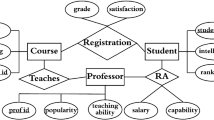Abstract
This paper tackles the problem of relational sequence learning selecting relevant features elicited from a set of labelled sequences. Each relational sequence is firstly mapped into a feature vector using the result of a feature construction method. The second step finds an optimal subset of the constructed features that leads to high classification accuracy, by adopting a wrapper approach that uses a stochastic local search algorithm embedding a Bayes classifier. The performance of the proposed method on a real-world dataset shows an improvement compared to other sequential statistical relational methods, such as Logical Hidden Markov Models and relational Conditional Random Fields.
Access this chapter
Tax calculation will be finalised at checkout
Purchases are for personal use only
Preview
Unable to display preview. Download preview PDF.
Similar content being viewed by others
References
Kersting, K., De Raedt, L., Gutmann, B., Karwath, A., Landwehr, N.: Relational sequence learning. In: De Raedt, L., Frasconi, P., Kersting, K., Muggleton, S. (eds.) Probabilistic Inductive Logic Programming. LNCS (LNAI), vol. 4911, pp. 28–55. Springer, Heidelberg (2008)
Getoor, L., Taskar, B.: Introduction to Statistical Relational Learning (Adaptive Computation and Machine Learning). The MIT Press, Cambridge (2007)
Kersting, K., De Raedt, L., Raiko, T.: Logical hidden markov models. Journal of Artificial Intelligence Research 25, 425–456 (2006)
Gutmann, B., Kersting, K.: TildeCRF: Conditional random fields for logical sequences. In: Fürnkranz, J., Scheffer, T., Spiliopoulou, M. (eds.) ECML 2006. LNCS (LNAI), vol. 4212, pp. 174–185. Springer, Heidelberg (2006)
Antanas, L., Gutmann, B., Thon, I., Kersting, K., De Raedt, L.: Combining video and sequential statistical relational techniques to monitor card games. In: Thurau, C., Driessens, K., Missura, O. (eds.) ICML Workshop on Machine Learning and Games (2010)
Kramer, S., Lavrac, N., Flach, P.: Propositionalization approaches to relational data mining. In: Dzeroski, S., Lavrac, N. (eds.) Relational Data Mining, pp. 262–291. Springer, Heidelberg (2001)
Dehaspe, L., Toivonen, H., King, R.: Finding frequent substructures in chemical compounds. In: Agrawal, R., Stolorz, P., Piatetsky-Shapiro, G. (eds.) 4th International Conference on Knowledge Discovery and Data Mining, pp. 30–36. AAAI Press, Menlo Park (1998)
King, R.D., Srinivasan, A., DeHaspe, L.: Warmr: A data mining tool for chemical data. Journal of Computer-Aided Molecular Design 15(2), 173–181 (2001)
Kramer, S., De Raedt, L.: Feature construction with version spaces for biochemical applications. In: Proceedings of the 18th International Conference on Machine Learning, pp. 258–265. Morgan Kaufmann Publisher Inc., San Francisco (2001)
Hoos, H., Stützle, T.: Stochastic Local Search: Foundations & Applications. Morgan Kaufmann Publishers Inc., San Francisco (2004)
Feo, T., Resende, M.: Greedy randomized adaptive search procedures. Journal of Global Optimization 6, 109–133 (1995)
Muggleton, S., De Raedt, L.: Inductive logic programming: Theory and methods. Journal of Logic Programming 19/20, 629–679 (1994)
Lee, S., De Raedt, L.: Constraint based mining of first order sequences in seqLog. In: Meo, R., Lanzi, P., Klemettinen, M. (eds.) Database Support for Data Mining Applications. LNCS (LNAI), vol. 2682, pp. 154–173. Springer, Heidelberg (2004)
Kersting, K., Gärtner, T.: Fisher kernels for logical sequences. In: Boulicaut, J.-F., Esposito, F., Giannotti, F., Pedreschi, D. (eds.) ECML 2004. LNCS (LNAI), vol. 3201, pp. 205–216. Springer, Heidelberg (2004)
Esposito, F., Di Mauro, N., Basile, T., Ferilli, S.: Multi-dimensional relational sequence mining. Fundamenta Informaticae 89(1), 23–43 (2008)
Ferilli, S., Di Mauro, N., Basile, T.M.A., Esposito, F.: θ-subsumption and resolution: A new algorithm. In: Zhong, N., Raś, Z.W., Tsumoto, S., Suzuki, E. (eds.) ISMIS 2003. LNCS (LNAI), vol. 2871, pp. 384–391. Springer, Heidelberg (2003)
Agrawal, R., Srikant, R.: Mining sequential patterns. In: Proceedings of the International Conference on Data Engineering, pp. 3–14 (1995)
Author information
Authors and Affiliations
Editor information
Editors and Affiliations
Rights and permissions
Copyright information
© 2011 Springer-Verlag Berlin Heidelberg
About this paper
Cite this paper
Di Mauro, N., Basile, T.M.A., Ferilli, S., Esposito, F. (2011). Optimizing Probabilistic Models for Relational Sequence Learning. In: Kryszkiewicz, M., Rybinski, H., Skowron, A., Raś, Z.W. (eds) Foundations of Intelligent Systems. ISMIS 2011. Lecture Notes in Computer Science(), vol 6804. Springer, Berlin, Heidelberg. https://doi.org/10.1007/978-3-642-21916-0_27
Download citation
DOI: https://doi.org/10.1007/978-3-642-21916-0_27
Publisher Name: Springer, Berlin, Heidelberg
Print ISBN: 978-3-642-21915-3
Online ISBN: 978-3-642-21916-0
eBook Packages: Computer ScienceComputer Science (R0)




